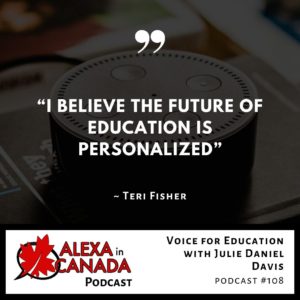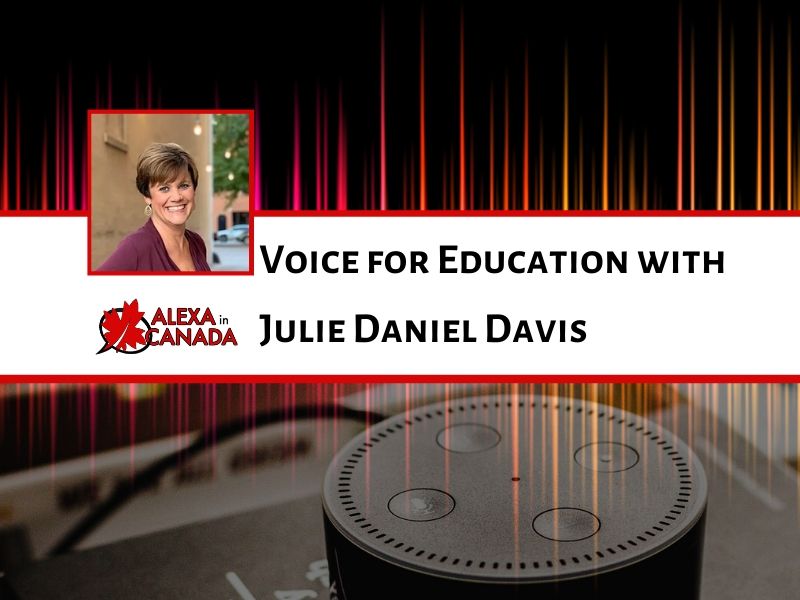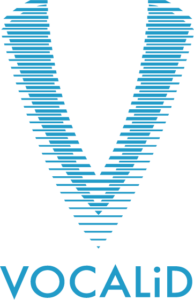AiC Episode 108
In this episode, Teri welcomes Julie Daniel Davis, a leader in the voice education space and the Director of Instructional Technology and Innovation at a private school in Chattanooga, Tennessee.
Welcome, Julie!
She is a go-to EdTech guru and has been doing a lot of work in her school by helping to implement voice technology in a safe and effective manner for her students. Julie has also been speaking in multiple places about the same and comes on to talk about education and using voice technology to help fulfill educational goals.
Taking Advantage of Voice Technology for Education
- She spoke at the first Alexa Conference (now known as Project Voice) in Chattanooga, TN in 2019.
- By sharing some of the blogposts she had written about using Alexa to explain her interest, Bradley Metrock, the event coordinator of the conference, not only invited her to take part in the conference, but also asked her to be a speaker.
- She asked Bradley if an educator could just sit in the back of the room and observe.
- She had beforehand dabbled with the idea of using voice in the classroom and even tried the concept out a few times, but held back due to privacy concerns.
- When the Echo Dot Kids Edition came out, she approached Bradley Metrock and told him she would like to pilot them in the classroom, and Bradley connected her to Dave Isbitski who helped her get a few of the Echo Dots to place in the classroom.
- They started using the Echo Dots for routines, reminders, and relevant Alexa skills.
- Blueprints were not available for the Echo Dot Kids Edition, so she begged Amazon to create them, and eventually Amazon came through.
- She believes in personalizing education and that formed the basis for their program where they make Alexa study guides for kids to study for tests. Teachers share those Alexa skills for studying with their families so that their families can use them to study at home.
- They also have an international program at their school through which Julie has been working with four international students who are English language learners. She is using Alexa to help them study for other exams, but what she has seen is that when the students answer Alexa, it helps them with their English pronunciation.
- She will be speaking at Project Voice 2020 and the students will be going with her to share their experiences.
Teachers Using the Echo Devices
- Teachers are not only using the devices in the classroom but also assigning students homework to go and use their devices at home.
- One of the advantages of having Alexa in a classroom is that it allows for small group instruction. A teacher can work with four or five kids over in one corner with one Echo device, and other small groups in other corners with their own Echo devices. They call that Station Rotation.

Privacy Issues and Using Multimodal Devices
- They don’t have to only use the Echo Dot Kids’ Edition.
- She freely uses other Echo devices because she doesn’t have to be FERPA and COPPA compliant at her school.
- She advises educators to be careful with how they set up their devices, how they use them, and how they store data.
- She has created a lot of infographics on her website that help educators set up their Alexa devices in a way that protects their students.
- For students under the age of 13, she only uses the kids’ edition Echo Dot, because the device is COPPA compliant. She uses other Alexa devices in the other grades.
- She has not used Alexa devices with screens because of their price point, but what she loves about using smart speakers in the classroom is their price point. They can put a smart speaker into a classroom for $30 to $50 and every student has access. In a world where there is so much talk about equity of access, this could be a huge way for rural or poorly funded areas to make sure students have access to the world at large.
Classroom Management via Smart Speakers
- She advises that a teacher should start off by telling the students what the expectations are. For example, students can’t just ask Alexa any question they want.
- A smart speaker helps keep the students engaged and listening to the responses that Alexa gives to the educational questions they collectively ask.
Teachers’ Reactions
- Julie asks teachers to pilot the smart speakers and that way teachers get to experience the benefits.
- When she first started out, some teachers were very skeptical about using them, and even now, some teachers don’t use them at all.
Thanks to our Sponsor:
VOCALiD is a breakthrough Voice AI solution company that combines state-of-the-art speech synthesis technology with advanced audio processing to create custom designed voices. Amplify and extend the reach of your messaging by augmenting your current voice solution with the robust always-on power of custom synthetic voice.
List of resources mentioned in this episode:
- Vocal ID
- The Comprehensive Flash Briefing Formula Course
- How to Turn FreeTime on Alexa On or Off
- Julie’s Website
- Julie on Twitter
- Julie on Instagram
Other Useful Resources:
- Voice in Canada: The Flash Briefing
- Complete List of Alexa Commands
- Alexa-Enabled and Controlled Devices in Canada
- Teri Fisher on Twitter
- Alexa in Canada on Twitter
- Alexa in Canada Facebook Page
- Alexa in Canada Community Group on Facebook
- Alexa in Canada on Instagram
- Please leave a review on iTunes
- Shopping on Amazon.ca













![Celene Osiecka of [24]7 on the Voice in Canada Podcast](https://voiceincanada.ca/wp-content/uploads/2021/10/Celene-Osiecka-of-247-on-the-Voice-in-Canada-Podcast-1.jpg)